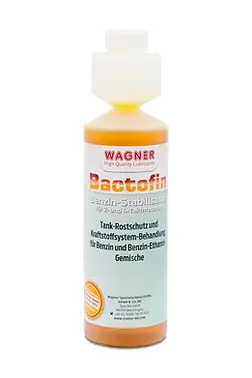We are all aware that recent 'improvements' to pump fuel can have a disastrous effect on the fuel systems in our classic cars, but as our cars are all going into winter storage I have been flooded with enquiries from people asking what they can do to mitigate the damage caused to their cars.
Over this year alone, we have flushed and rebuilt over 90 fuel systems, with an average bill of £600 + VAT, so this is a very real problem, and not one that effects cars that have just run on E10. Those who have religiously used premium E5 fuel have also had issues.
Over the last few years, we have tried a number of the well known additives in our own and clients cars, with very mixed results, so in the last few months we have been taking advise from Wagner Oils and testing their Bactofin additive. After 6 months of use, across 20 vehicles we can confirm that Bactofin 'does what it says on the tin' eliminating modern fuel damage.
The problems with modern fuel
Modern fuel is not simply petrol. It is now a combination of petrol, ether (which improves the Octane value) and ethanol (which is a plant based fuel). E10 is a lower Octane fuel containing 10% ethanol. E5 (or premium fuel) is a higher Octane fuel with up to 5% ethanol, but considerably more ether. Both cause different problems in classics
Ethanol issues
WATER CONTAMINATION - Although ethanol on its own does not cause a problem, its side effects have a massive impact on classic car owners. It is hydroscopic, which means it sucks water out of the atmosphere. This water condenses in cold fuel tanks and separates out. This causes corrosion inside the tank which breaks away, blocking fuel lines, filters and pathways in your carburettor
BACTRIAL GROWTH - Bacteria found in ethanol breeds in the water in your fuel tank. It excretes acid as it multiplies and it is this acid that has a disastrous effect on all rubber components, gaskets, brass and aluminium components found in fuel systems.
Ether issues
EVAPORATION - Ether is an ultra distilled element of oil. It is highly flammable and also evaporates very quickly. Left in a semi-open environment such a classic car fuel tanks it quite literally disappears into the atmosphere. Over a period of 2 to 3 months the Octane value plummets and the fuel goes 'stale'.
BORE WASH - We are noticing more and more fuel contamination in the regular oil services we carry out. This is because the super thin premium fuel is finding its way past the piston rings, especially for those cars that are left at idle to warm up after or during storage. This thins the oil and dramatically increases engine wear.
EMULSION - As the ether evaporates, it leaves behind a sticky residue which clogs up injectors, carburettors and fuel pumps.

Buy Bactofin
Bactofin mixes at 1000 to 1. So a 250ml bottle will treat 250 litres of petrol and is just £18.95 + P&P.
If you would like us to send you a bottle, just drop us an email and we will get some sent out in the post, or come into the workshop where we have plenty of product for sale.
How does Bactofin work?
Bactofin is the only additive that combats all of these issues by doing a number of things when mixed with pump fuel:
- Kills the bacteria in ethanol and in your fuel tank
- It binds water molecules to the fuel, stopping it separating. This means: no corrosion and you burn the water content every time you drive, removing the bacteria's habitat to breed.
- It stabilises the ether content in the fuel prolonging its shelf life for up to 6 months before noticeable Octane loss happens
- In addition Bactofin has cleaning agents and a lead additive making sure that it is the only product you need to regularly use to keep your fuel system clean and free from ethanol and water damage.